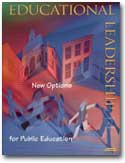Joe Nathan wants schools to be different. Not different in his way only, but different in different ways. He knows the kind of education he prefers, of course, but he also knows it's not for everyone—so if some schools are to have what he wants, others cannot. "You just can't have a Core Knowledge Montessori school," he argues. "It's not possible. You have to choose."
Nathan has been crusading for choice for at least 25 years. He helped start the St. Paul Open School in St. Paul, Minnesota, one of the few early public alternative schools that is still going strong. His quest for more flexible education began even earlier, he told me recently. Denied permission at age 10 to be absent from school to hear a well-known writer speak about racial discrimination, he decided that "School was getting in the way of my learning."
In this issue, Nathan (p. 16) describes four charter schools that he believes are not "getting in the way." He concedes that it's too early to know what impact such schools will have in the long run (the idea is only five years old, he points out, and as with any five-year-old, we don't know what it will grow into). A hopeful sign, he thinks, is that a few charter schools in California, Colorado, and Minnesota have been closed for poor performance. "That's accountability," he says, "and that's what we need: financial and educational accountability."
Charter schools are among the many options cropping up to diversify and in some cases challenge traditional forms of public education. The increase in districtwide choice programs, magnet schools, home schooling, and performance contracting raises numerous questions: What types of schools should be permitted, and how will that be determined? Will parents be able to make informed choices? Will provisions for choice help or hinder equity?
Two authors report research findings bearing on these questions. Sally Bomotti (p. 30) has found that, contrary to critics' suspicions, parents in her middle-class district choose alternative schools for their distinctive educational programming. Maureen Petronio (p. 33), on the other hand, shows that some parents find even model schools of choice program confusing and frustrating.
Joe Nathan believes that charter schools are an especially good option because they promise two-way accountability. Charter schools must declare what they will do for students and, theoretically at least, must provide solid evidence—to families and to taxpayers—that they are doing what they promised. He opposes voucher plans because they lack such accountability. "Schools exist in part to serve individual youngsters and in part to serve the needs of society," he argues, "so it's entirely appropriate for the public to set expectations for any institution that gets public funds." To Alex Molnar (p. 9), however, that's not nearly enough. He warns that the charter school movement is undermining the education profession. Even worse, it allows the public to avoid the ultimate accountability: providing uniformly high-quality education to all, especially to urban children living in poverty.
Like them or not, options are here, with great potential for good and for harm. Summarizing research findings on the effects of choice, Bruce Fuller (p. 37) calls the movement "a vibrant response to the increasingly pluralistic character of American society." Nevertheless he warns against "rushing headlong down the path of unrestrained school choice." Noting that poorly designed programs accomplish little more than giving additional perks to already advantaged middle-class families, he advises designers of future programs to learn from past mistakes. Joe Nathan and other responsible advocates strongly agree. Society must maintain a balance between the private purposes of education and the public ones.
